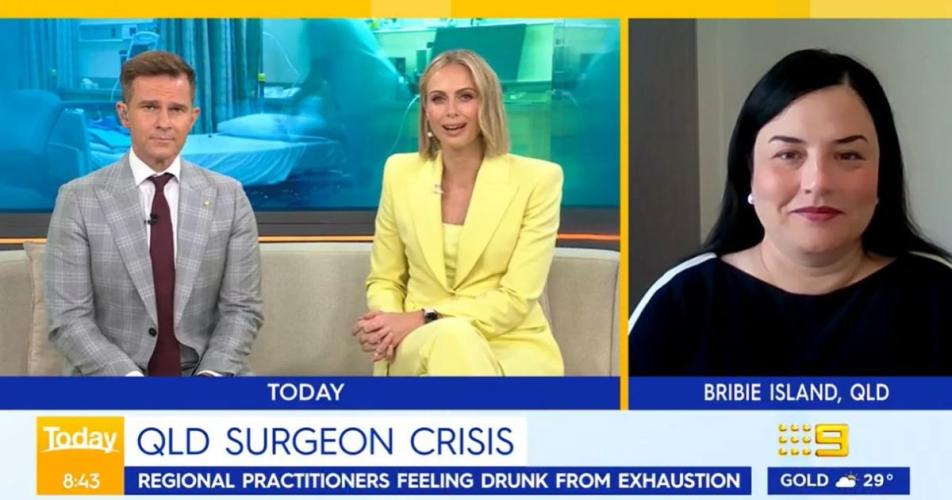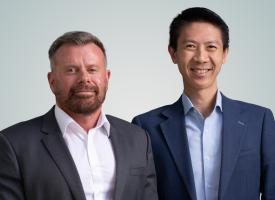Regional healthcare workforce needs critical support
In response to recent developments that reveal Queensland surgeons are so tired they feel drunk on the job, AMA Queensland President Dr Maria Boulton told the Today Show that the governments promised funding urgently needs to be put into action. "What we'd like to see is that work progress. We have the promise of funding. Now, we need to see that action."

Transcript: AMA Queensland President, Dr Maria Boulton, Today Show with David Campbell and Sylvia Jeffreys, Monday 11 December 2023
Subjects: Regional Queensland healthcare
DAVID CAMPBELL: In an alarming development, surgeons in Queensland have revealed they are so tired, they feel drunk while on the job.
SYLVIA JEFFREYS: The admission has prompted an emergency round table to try and resolve the critical staffing shortage. For more, let's bring in Queensland President of the Australian Medical Association, Dr. Maria Boulton, in Bribie Island. Maria, good morning to you. What do you believe is behind this level of burnout?
DR MARIA BOULTON: Good morning, Sylvia and David. There are many reasons, but the main reason is the lack of workforce. We don't have enough doctors, we don't have enough nurses or other healthcare workers, and this is especially felt in regional Queensland. As you know, Queensland is the most decentralised state and a lot of our population lives outside metro areas, and it is the regions that are feeling this more acutely. And at the end of the day, it is patients that suffer. They're the ones that get ramped in ambulances waiting, and they're the ones that get put on extensive waiting lists for elective surgery. And that is why we must do everything possible to turn this around.
DAVID CAMPBELL: And we need our surgeons to be tip-top shape mentally as well. They can't be acting like they're tired and drunk, not really drunk but feeling that they are that way. Earlier this year, Queensland Health revealed a vacancy rate of 15 per cent for those rural and remote doctors. So what can the state do to encourage more people to get to those regional areas under these conditions?
DR MARIA BOULTON: The first step is to ensure that the doctors and nurses that we have in those areas are supported. We just can't afford to have them leave to other states. We keep hearing time and time again from our members who work in regional areas that regional hospitals in New South Wales compared to Queensland are better supported and that they're able to work without the fatigue levels and they're able to do more in those hospitals because of the support that they receive.
We have seen some positive movement though. We have seen an extension of the grants offered to healthcare workers. They've been extended to part-time consultants as well, and that's something that we've been calling for. We also need to support our international medical graduates. In Queensland, 50 per cent of our workforce is overseas trained. When they come to this country, at times, they feel unsupported navigating a new culture, navigating a new hospital system. So it's really essential that they are supported.
The other thing is we need to look at training more. At the moment, we're not training enough medical students and we are supporting the state's call for more commonwealth supported medical student placements and ways to attract them to regional and rural areas. We know for a fact that people who come from those areas and are trained as doctors and nurses are more likely to stay in those areas. We also know that if you offer someone a great experience like I was in a regional or rural area in Queensland, they're more likely to work in that area when they graduate.
SYLVIA JEFFREYS: Well, we know Annastacia Palaszczuk is stepping down at the end of this week, so what will you be asking of her successor?
DR MARIA BOULTON: We've seen some great action from the Premier. She has funded 2,500 new hospital beds and she has funded other recommendations made by our ambulance ramping round table.
What we'd like to see is that work progress. We have the promise of funding. Now, we need to see that action. We also need to see some action when it comes to people waiting on elective surgery lists. We also need to see more support for rural and regional Queensland and we don't want things to slow down. These are things that need to be done and they needed to be done yesterday.
So we'd just like to see some forward momentum. We just can't afford for it to slow down because we can't afford for people to continue to be waiting to get an emergency bed, to get a hospital bed or to receive that elective surgery that they so desperately need.
DAVID CAMPBELL: All right, Dr Maria Boulton, we'll leave it there. Thank you so much for your time.



